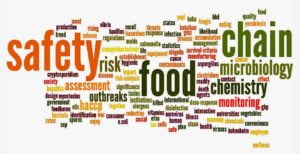 There are more than 500,000 cases of food poisoning in the UK each year with Campylobacter being considered as responsible for more than half of those, in turn leading to more than 100 deaths a year.
There are more than 500,000 cases of food poisoning in the UK each year with Campylobacter being considered as responsible for more than half of those, in turn leading to more than 100 deaths a year.
Roughly four in five cases of Campylobacter poisoning in the UK come from contaminated poultry but it can also be found in red meat, unpasteurised milk and untreated water. Although it does not normally grow in food, it spreads easily and has a low infective dose so only a few bacteria in a piece of under-cooked chicken, or bacteria transferred from raw chicken onto other ready-to-eat foods, can cause illness.
EU and UK regulations state that all food handlers must receive appropriate training in food safety practices relevant to their duties. However, having a good understanding of food safety practices is not only a legal requirement, it is also essential in protecting the health of both consumers and food handlers.
We offer various Food Safety courses including the basic Food Safety Awareness course which is aimed at anyone who requires induction training before starting to work with food, staff who are low-risk food handlers, and those who wish to update their food safety knowledge. We also offer E-Learning Food Safety Awareness at Levels 1 & 2.
Our Level 3 Award in Food Safety in Catering (QCF) course is accredited by Qualsafe Awards, one of the largest Ofqual recognised Awarding Organisations in the UK, and is aimed at those working, or planning to work, in the food and catering industry. Over this one day course, through a variety of training methods, participants will gain a strong understanding of the importance of food safety, including correct food handling practices and measures to reduce the risk of contamination.
Food Safety also applies not only in the Kitchen but also in the garden, specifically when BBQ’ing. Just because you’re cooking outdoors, don’t let your good habits in the kitchen go up in smoke when you light the barbecue – you want those who have enjoyed your hospitality to go home with memories of a good time, not a tummy bug to remember you by. You MUST ensure that food is stored and cooked safely on a BBQ.
Warm weather and outdoor cooking can produce the right conditions for the bacteria which cause food poisoning. Food is away from your fridge for a longer period of time when cooking and eating outdoors which can lead to germs multiplying quickly. Keep perishable foods like salads, coleslaw and quiche in your fridge until you need them.
Before you start:
- Make sure frozen foods are fully thawed before you start cooking them.
- Keep foods you plan to cook properly chilled in the fridge or a cool box until needed.
- Light your barbecue well in advance – for charcoal barbecues, the flames should have died down before you start cooking.
- Wash your hands before and after handling food.
Remember to keep raw meat separate from cooked meat and ready-to-eat foods like salads. Cross-contamination is most likely to happen when raw food touches or drips onto ready-to-eat food, utensils or surfaces.
- Always use separate utensils for handling raw and cooked meat when cooking and never put cooked food on a dish that has been used for raw meat or poultry (unless it’s been thoroughly washed in between)
- Keep food covered whenever possible
- Cook food at the right temperature and for the correct length of time to ensure that any harmful bacteria are killed.
- Burgers should always be served well done
- Consider cooking all chicken and pork in the oven first, then giving it a final finish on your barbecue.
By following these simple tips you’ll ensure a safer, more enjoyable summer for you and those around you.
Nigel Braybrooke, Consultant and Lead Food Safety Advisor
Whatever your training needs, give us a call today 0117 958 2070 or e-mail us
